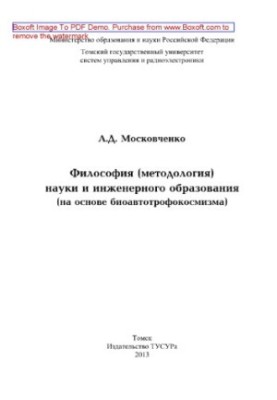Philosophy (methodology) of science and engineering education (based on bioautotrophosmism). Monograph
 Instant download
Instant download
after payment (24/7)
 Wide range of formats
Wide range of formats
(for all gadgets)
 Full book
Full book
(including for Apple and Android)
The book "Philosophy (methodology) of science and engineering education (based on bioautotrophosmism)" is a unique study that combines philosophical reflections, scientific approaches and educational methods. The team of authors working on this monograph seeks to provide readers with a fresh perspective on the interaction of science and engineering education, relying on the concept of bioautotrophosmism. This concept, while complex, opens new horizons for understanding the relationship between nature and technological progress. The book will be of interest not only to students and teachers of engineering specialties, but also to everyone who is interested in the philosophy of science, ecology and sustainable development. It is suitable for both young scientists and experienced professionals seeking to expand their knowledge of methods and approaches in education and science. Readers keen on questions about how technology can coexist with nature will find plenty of inspiration and practical guidance in this book. One of the key topics raised in the monograph is the need to rethink traditional educational models in the light of modern challenges. The authors emphasize that engineering education should be not just a transfer of knowledge, but also the formation of critical thinking, able to adapt to a rapidly changing world. Bioautotrophosmism, as a concept, offers a new approach to learning that is based on the principles of self-regulation and sustainability, which makes it especially relevant in the context of global environmental problems. The style of the authors is distinguished by the depth of analysis and the availability of presentation, which makes it easy to perceive complex philosophical ideas. They use real-world examples and current research to demonstrate how philosophy can be integrated into educational processes. This makes the book not only a theoretical work, but also a practical guide for teachers and students. The book Philosophy (Methodology) of Science and Engineering Education also raises important questions about the role of science in society and how engineering solutions can affect environmental sustainability. At a time when humanity is facing serious environmental challenges, such reflections become especially relevant. The authors call for a deeper understanding of scientific and engineering practices, which, of course, makes their work a significant contribution to modern scientific discussion. If you are looking for books that will help you better understand the philosophical aspects of science and education, pay attention to works such as Karl Popper's Science as Art or Tom Nagel's Philosophy of Science. These books, like the work of a team of authors, offer in-depth reflections on how science and education can interact to create a more sustainable future. In conclusion, "Philosophy (methodology) of science and engineering education (based on bioautotrophosmism)" is not just a book, but a whole philosophical platform for thinking about the future of science and education. It inspires new ideas and approaches that can change our perception of engineering education and its role in the world. Read this monograph if you want to be at the forefront of scientific and educational changes, and discover new horizons of knowledge!
LF/893558323/R
Data sheet
- Name of the Author
- Collective of authors
- Language
- Russian
- ISBN
- 9785868896675

























